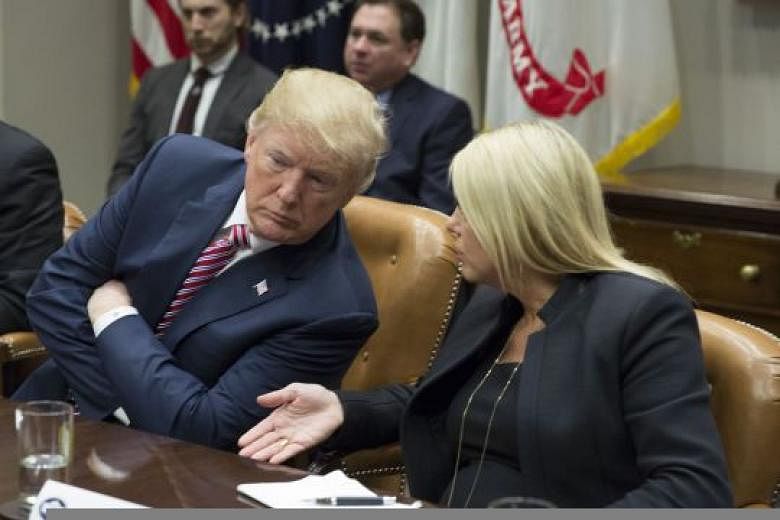FORT LAUDERDALE (Florida)• • United States educators have expressed frustration at a proposal by US President Donald Trump for teachers to take up arms to defend their classrooms against school shooters.
Educators, still reeling from gun violence that left 17 dead at Florida's Marjory Stoneman Douglas High School on Feb 14, said using lethal force in a crowded hallway or against one of their students was unimaginable.
They wondered about scenarios in which they could face shooters on a hectic campus - or even, potentially, draw a gun to confront an armed and dangerous student.
"There's no way I would do that," maths teacher Jim Gard said of Mr Trump's proposal. "I would retire."
Mr Gard, who teaches at Marjory Stoneman Douglas, barricaded students in his darkened classroom last week while bullets flew. Policymakers, he said, "need to do their job and control guns first".
"If it gets to the point where we have to arm our teachers, then we have completely failed, completely failed as a society," Mr Gard said.
Mr Trump suggested arming a significant portion of the educator workforce - between 10 and 40 per cent of teachers - using federal resources. He said military veterans who teach would be prime candidates for these roles. "We have to harden our schools, not soften them," Mr Trump said during a White House meeting on Thursday.
Many schools already hire police officers or armed guards to patrol campuses with the help of federal money. About 57 per cent of public schools in the 2015/2016 school year had security staff on campus at least once a week and nearly 43 per cent were patrolled by armed law enforcement officers, according to federal data.
But that is no guarantee a shooter would be stopped by an armed teacher or armed officer.
It emerged on Thursday that the only armed sheriff's deputy at Marjory Stoneman Douglas took cover outside instead of charging into the building when the massacre began, the Broward County Sheriff said.
Sheriff Scott Israel also acknowledged that his office received 23 calls related to the suspected shooter going back a decade, including one last year that said he was collecting knives and guns, but may not have adequately followed up.
The deputy, Mr Scot Peterson, resigned on Thursday after being suspended without pay after Mr Israel reviewed a surveillance video.
"He never went in," Mr Israel said at a news conference. He added that the video showed Mr Peterson doing "nothing".
"There are no words," said Mr Israel, who described himself as "devastated, sick to my stomach".
Surveillance video, which was not released, showed that Mr Peterson remained outside the west side of the building for at least four minutes while the gunman was inside, according to Mr Israel. The shooting rampage lasted less than six minutes. The video was corroborated by witness statements, Mr Israel said.
School security experts say the best defence against a school shooting are preventive measures intended to identify troubled students and intervene before they turn violent, not putting guns in the hands of teachers.
"The proposal to arm teachers might be emotionally appealing after a school shooting, but it is not practical or realistic," said Dr Dewey Cornell, a University of Virginia professor who studies school safety.
"We should place more emphasis on preventing shootings than preparing for shootings. Prevention must start long before a gunman shows up at school. Instead of more guards, we need more counsellors."
Mr Trump's proposal is unlikely to get traction in Congress, where some members of the President's party have already rejected it.
It would be costly and time-consuming to train just 10 per cent of the educator workforce. With 3.2 million teachers in public schools and 400,000 in private schools, it would mean preparing and arming 360,000 to 1.4 million educators.
WASHINGTON POST, NYTIMES

